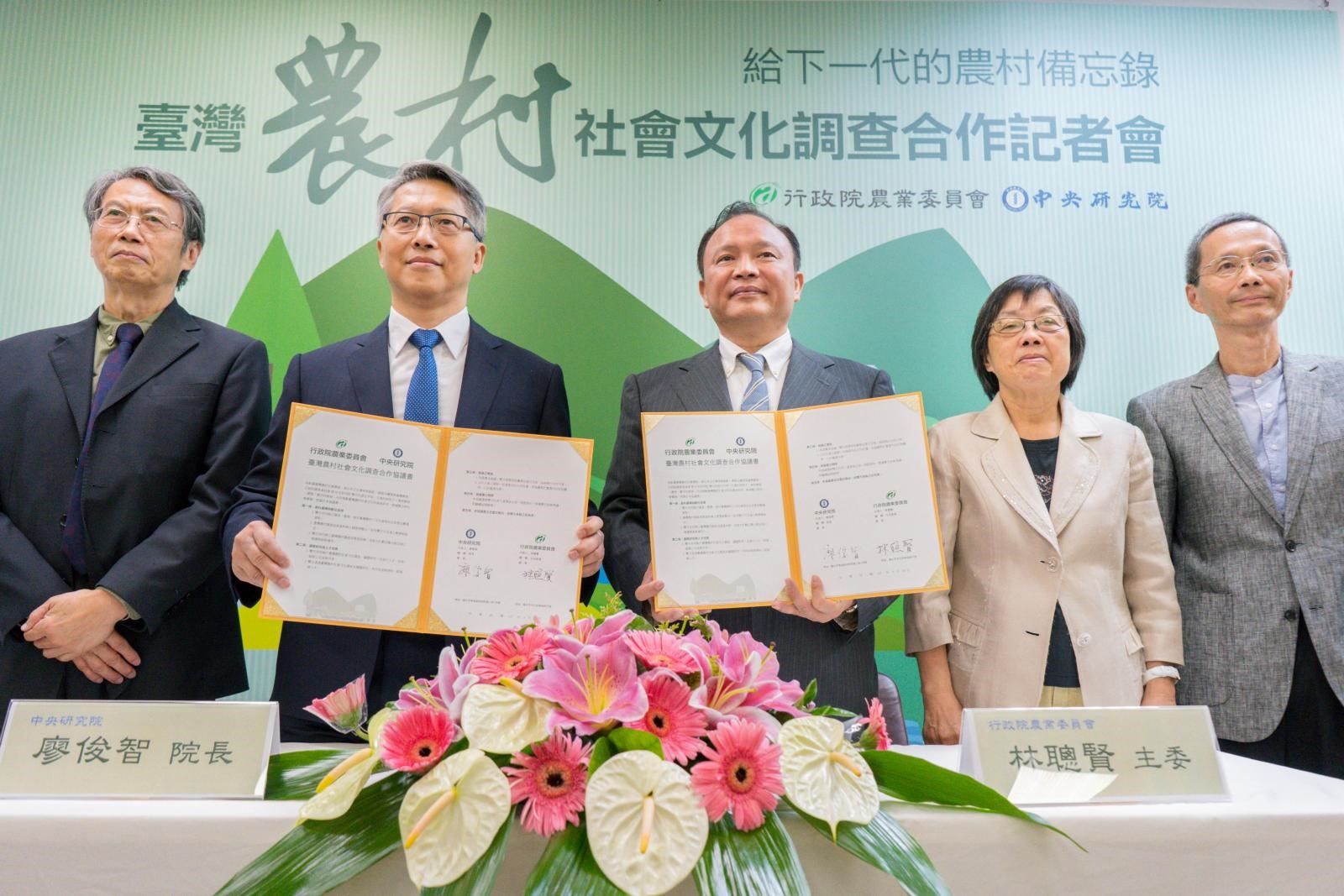News
The Council of Agriculture and Academia Sinica Join Forces for the First Time to Prepare a Rural Memorandum for the Next Generation
The Council of Agriculture (COA) and Academia Sinica co-organized the Social and Cultural Survey of Rural Taiwan Cooperation Press Conference which took place at the COA on Sept. 26. The said event saw the signing of Social and Cultural Survey of Rural Taiwan Cooperation Agreement by COA Minister Lin Tsung-hsien and Academia Sinica President Dr. James C. Liao to initiate for the first time ever the inter-agency and interdisciplinary cooperation between these two institutions. The mutual effort would conduct a 5-year systematic survey on rural anthropology and its historical changes in Taiwan. The project establishes a database of crucial humanities and social factors such as Taiwan’s rural environment, industry, society, culture, and historical transitions. This database would be used for interdisciplinary analytical researches in search of optimal measures that would nurture a more resilient agriculture, foster sustainable rural development, and allow rural culture to become the force behind social unity and stability. Furthermore, it offers investigative research results for the enhancement of agricultural talent incubation as well as the continuous monitoring of agriculture and rural society’s current situation and transition. The goal is to accumulate and deepen the understanding of rural communities in order to help create innovative and administrative models, achieve regional proliferation effect through promotion, incite Taiwan’s sustainable rural development, and the balance between rural and urban areas.
Recording, witnessing and studying the Wonderful Changes of Rural Communities in Taiwan
To promote Rural Revitalization ver. 2.0, the COA joined forces with Academia Sinica for the first time, and Academician Wang Ming-ke was appointed the leader of the Social and Cultural Survey of Rural Taiwan Project. Through interdisciplinary integration, the project employed the expertise of more than 200 experts in the field of humanities and social sciences who would conduct a 5-year survey starting this year focusing on rural Taiwan’s current situation such as household, community, township, watershed among other varied spatial and communal level economic, social, and cultural structures. The work covered topics on demographics, land, natural resources, hazardous environmental factors, economic activities, social organizations, social division of labor and order, social conflict, religion, folklore, cultural assets, educational facilities and cultural participation, medical care, gastronomy and attire culture, residential environment, transportation, leisure and entertainment among others. The survey included both current situation and historical documents to further analyze the transitional course of rural Taiwan’s environment, industry, society, and culture. Moreover, a digital database and website would be created to store, search, analyze, present, and interpret all the collected information for the sake of the development of next generation agriculture and rural communities.
In the conference, Academia Sinica’s Director of the Institute of Taiwan History Hsueh-chi Hsu, and Director of the Institute of Sociology Gwo-Shyong Shieh shared rural stories that the survey team has come across while conducting field studies since the beginning of the project. The team had first-hand experience of rural Taiwan’s everyday legacy and innovative energy, as well as the momentary phases in the transitional process of Taiwan’s society and industry, which reflect how agricultural technology affected life in rural societies.
Together for a Better Change
The Academia Sinica pointed out that rural Taiwan and current Taiwanese social issues have come into its attention. As the highest academic and research institution in Taiwan, the Academia stays true to its belief of Knowledge Serving Society, and actively plays the role of Government Advisor. Moreover, based on the responsibility and care towards Taiwan, it expects that the Social and Cultural Survey of Rural Taiwan research can assist the government in solving upcoming urban issues, rural issues, rural revitalization, cultural legacy inheritance, and enhancing rural social values.
The COA stated that the said project cooperation is comparable to farmers patrolling their fields, which is an extremely important fundamental work. It is expected that social science can help rural life transformation interpret history, while historical science can help contemporary rural social event researchers obtain backgrounds or origins of the events through this inter-agency and interdisciplinary collaboration. It would contribute to policy planning, implementation, feedback, amendment through scientific surveys and topic researches; thus, construct a sustainable system and cycle mechanism for rural Taiwan to move forward. The general objective is to accumulate experience through practice, discover problems based on facts and face them with sincerity so that rural communities may achieve sustainable development being both attractive and competitive.
The COA further explained that the 6th National Agricultural Congress (NAC) has drawn an outline of Taiwan’s prospective rural policy for the future in its concluding report. The COA vows to preserve and maintain Taiwan’s rural environment full of life and culture. The Council also puts emphasis on traditional rural social culture as well as records and passes on agricultural knowledge; therefore, helps establish innovative management models to promote and achieve regional proliferation effect. The COA strongly believes that human is the core element in agriculture and rural community. It looks forward to working with Academia Sinica and to surveying the nature of rural society while simultaneously enhance talent incubation to produce versatile rural promoters and participants. The goal is to create an integrated multi-sectorial rural development model. The COA-Academia Sinica Team would work with full dedication on the promotion of such crucial project. The team hopes to implement future research results for a sustainable rural development centered on people, nature, and social culture, which gradually applies to society in general for a better future.

